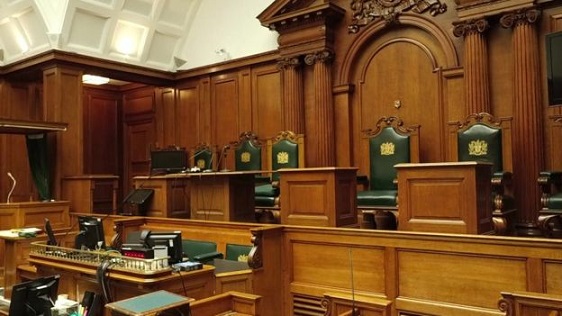
The Head of the Judiciary in England and Wales has told Sky News the first year of allowing cameras crown court rooms has been a “complete success”.
A year ago today, the first cameras were allowed into a criminal court room in England, broadcasting the sentencing remarks by the judge in the case of Ben Oliver, who had been convicted of the manslaughter of his grandfather.
Since then, the sentencing remarks in 33 cases, including Thomas Cashman and Wayne Couzens, have been broadcast live on networks like Sky News.
The Lord Chief Justice, Lord Burnett of Maldon had been pushing to allow the filming and broadcasting of some sentencing remarks since he came into the role 2017, and says it has been a critical part of making the justice system more open and accessible to the public.
He said: “I think it’s been a complete success. We see in many news reports, short extracts from sentencing remarks, which contain the heart of what has happened… And it’s also helped to show people that judges are not as portrayed in TV dramas or on films sitting there in long wigs, most of them foaming at the mouth and in their 80s but are a broad cross section of society.”
Taking pictures or filming in court is contempt, but the law was changed to allow broadcasters to film sentencing remarks – when permitted – in the hope of better informing the public.
Filming has been allowed in the Court of Appeal since 2013, while criminal court proceedings can also be televised in Scotland, although it happens rarely.
Parliament is now consulting on whether to expand filming in England and Wales to include more senior judges in the Crown Court.
‘Likely’ that some types of civil proceedings could be shown
Lord Burnett believes the obvious next step is “to broadcast an increasing number of sentencing remarks in cases in which the public have a genuine interest. And that will inevitably happen in the coming months and years. I suspect also that the range of cases that can be used for broadcasting sentencing remarks will be expanded.”
He also thinks the type of cases shown will expand and said: “I also think that it’s likely that some types of civil proceedings will also come within the broadcasting net, and particularly high profile challenges to government decisions that are heard in the administrative courts.”
The reason cameras are not allowed in court rooms in England and Wales are to protect the judicial process, and Lord Burnett says while expanding the public’s understanding of how legal decisions are made is important, there are lines which should not be crossed.
He said: “Legal proceedings, whether they’re civil proceedings concerning money or appeal proceedings, which are by and large broadcast now, and criminal proceedings are important, solemn, proceedings. They’re not a form of public entertainment. And I do worry that some of the broadcasting that we’ve seen around the world has simply turned into daytime TV entertainment, and that I don’t think is in the interest of justice.
Read more:
Man who fatally shot police officer while handcuffed jailed for life
Man who served 17 years in prison has rape conviction overturned due to DNA evidence
“Personally, I think that a line is likely to be drawn at the broadcasting of the evidence of witnesses. Witnesses are under a huge amount of pressure in any proceedings, irrespective of their nature, and adding the possibility of it being broadcast and seen by hundreds of thousands, or millions of people, it seems to me to be something that’s very difficult to contemplate.
“The other thing one’s got to bear in mind, particularly in the criminal context, is that there are an awful lot of people involved in criminal cases, who for one reason or another, are entitled to anonymity.
“And so one’s got to be extremely careful about inadvertently transgressing statutory lines.”
Source: ![]() news.sky.com
news.sky.com






Be the first to comment